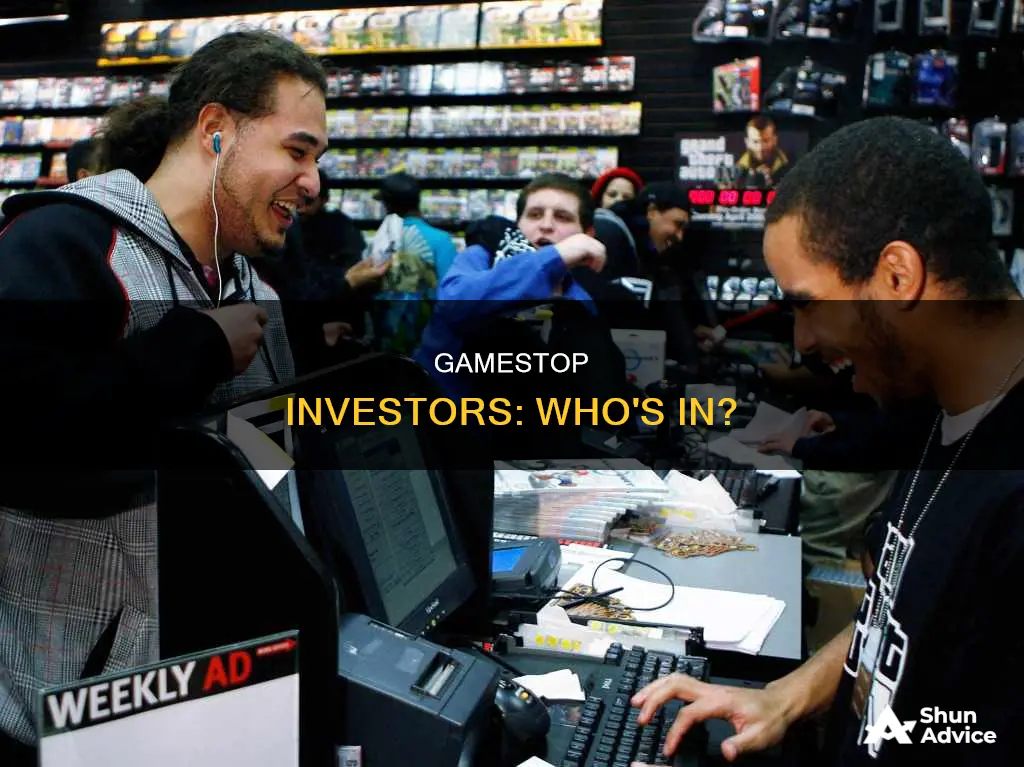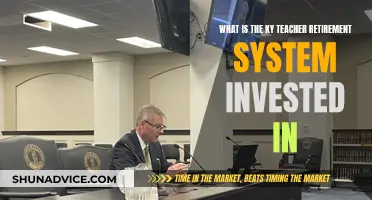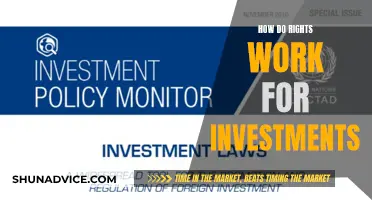
In January 2021, amateur investors on Reddit noticed that the short interest in GameStop exceeded 100%. This led to a surge in the company's stock price, which skyrocketed from $17.25 to over $500 per share. The stock's volatility was partly due to the massive buying power of retail investors.
The exact number of people who invested in GameStop during this time is unclear, but several individuals became overnight millionaires, including Arzel Rodriguez, a 23-year-old software engineer who turned $28,000 into $3.8 million, and Kevin Sanzone, a 27-year-old purchasing manager who made $1.8 million.
What You'll Learn

How much money was made by those who invested in GameStop?
The amount of money made by those who invested in GameStop varies depending on when they bought and sold their shares. The stock price skyrocketed from under $20 per share to over $400 during the 2021 rally, forcing trading app Robinhood to pause trading as investors rushed to buy.
Some investors became overnight millionaires, such as Arzel Rodriguez, a 23-year-old software engineer who turned his $28,000 investment into $3.8 million. Similarly, Kevin Sanzone, a 27-year-old purchasing manager, invested $140,000 and made $1.8 million. Jason Monahoyios, a 28-year-old project manager, also made a million dollars. Travis Martin, a 23-year-old aspiring baseball player, invested $38,000 and made $1.3 million.
However, those who bought at the peak of the frenzy would have lost a significant amount of money. For example, if someone bought $1,000 worth of shares at the all-time high of $483 per share on January 28, 2021, their investment would have lost 77.5% of its value by January 18, 2022, leaving them with only $225.71. Even if they had waited for the shares to crash after the all-time high and bought at the closing price of $193.60, they would have still lost just under 50% of their investment by the next year.
Overall, the GameStop stock price surge was a highly volatile event, with some investors making millions while others lost significant portions of their investments.
Investments: The Drive to Gain More
You may want to see also

How did the investors coordinate?
The investors in the GameStop short squeeze coordinated through the subreddit r/wallstreetbets, an online community on the social news website Reddit. The community is known for its discussions about meme stocks and high-risk stock transactions. Observers congregating around r/wallstreetbets believed that the company was significantly undervalued, and with a large amount of the stock being shorted, they could trigger a short squeeze by driving up the price and forcing short sellers to buy back their shares at a loss.
The movement was also spread through other social media platforms, such as Instagram and Discord. For example, Arzel Rodriguez, one of the investors, posted screenshots of his Robinhood holdings on Instagram, which caught the attention of a long-forgotten middle school classmate, Travis Martin. Martin then invested about $38,000 in GameStop options, and the two exchanged notes about the company.
The investors also coordinated through text and phone calls. For instance, Rodriguez and Martin texted back and forth about GameStop, and Rodriguez spent 25 sleepless hours unwinding his position, sustained by coffee and energy drinks.
Americans: Investors or Not?
You may want to see also

What was the impact on the company's share price?
The impact on GameStop's share price was significant and volatile. In January 2021, a short squeeze on the stock took place, causing a rapid increase in the share price. The price rose from around $20 at the beginning of the month to a pre-market value of over $500 per share ($125 split-adjusted) on January 28. This was driven by a community of amateur day traders, largely organised through the subreddit r/wallstreetbets, who sought to fuel a short squeeze and trigger losses for hedge funds that had bet against the company. This community was taking advantage of the fact that approximately 140% of GameStop's public float had been sold short, meaning that short sellers would have to buy back shares at a higher price to cut their losses, further driving up the share price.
The share price then experienced a sharp decline, falling to around $40 in February 2021. However, the price continued to be volatile, with sharp increases and decreases. For example, on February 24, the stock price doubled within a 90-minute period, and then averaged around $200 per share for the next month. On March 24, the stock price fell 34% to $120.34, but then recovered by 53% the next day.
The share price continued to be volatile in 2023 and 2024. For example, on March 22, 2023, the stock price rose sharply, triggering a national conversation about access to financial markets. On March 1, 2024, the stock was trading at $15.09, and on June 17, 2024, it was trading at $13.99. Despite a 33% rise in 2024 to 24.53, shares of GameStop were down more than 20% from where they were a year ago.
Overall, the impact on the company's share price was highly volatile, with rapid increases and decreases, and the price in mid-2024 was significantly lower than the highs of late January 2021.
Doge Investors: Who and How Many?
You may want to see also

What was the impact on the company's revenue?
The impact on GameStop's revenue was significant and varied over time. The company's stock price experienced a rollercoaster, with sharp increases and decreases, but the overall trend was downward between early 2021 and late 2023.
In January 2021, GameStop's stock price skyrocketed to a premarket high of over $500 per share, up from around $17.25 at the beginning of the month. This surge was driven by a short squeeze orchestrated by retail investors on Reddit, primarily on the subreddit r/wallstreetbets. The unprecedented surge in the stock price caused major financial losses for short sellers and hedge funds.
However, the stock price began to decline after reaching its peak, and by February 2021, it had dropped to around $90 per share. GameStop's stock continued to experience volatility, with sharp ups and downs, but failed to reach the same highs as during the short squeeze. By March 2021, the stock had reached a post-squeeze high of $264.52, but it subsequently entered a downward trend, falling below $90 per share in mid-May 2022.
The impact of the short squeeze on GameStop's revenue was complex and had both positive and negative effects. On the one hand, the surge in stock price likely brought significant gains to the company and its investors. The company took advantage of the high stock price by issuing new shares, raising over $900 million in the process. This influx of capital could have potentially helped GameStop's financial position and provided resources for strategic initiatives.
On the other hand, the extreme volatility and subsequent decline in stock price may have created challenges for the company's financial planning and stability. The short squeeze also attracted regulatory scrutiny and led to lawsuits against Robinhood, the trading platform popular among retail investors, for its role in restricting trading during the short squeeze. The negative publicity and legal repercussions could have impacted GameStop's reputation and potentially deterred some investors.
In conclusion, the impact on GameStop's revenue was twofold. The short squeeze caused an initial surge in stock price, which likely boosted the company's financial position, but it was followed by a period of volatility and decline. The overall effect on the company's long-term revenue remains to be seen, as GameStop continues to navigate the challenges of a changing industry and competition from digital distribution services.
Investments: Are They for Everyone?
You may want to see also

What was the impact on the company's reputation?
GameStop's reputation has been impacted in several ways. The company was at the centre of a strange and singular moment in Wall Street history, where amateur investors coordinated on Reddit to buy shares in the company, causing its stock price to skyrocket. This had a positive impact on the company's reputation among some investors, with a few individuals becoming overnight millionaires. However, it also sparked a national conversation about access to financial markets and led to criticism of the company's practices.
GameStop has been criticised for its treatment of employees, including low pay, long hours, and strict sales quotas. The company has also been accused of unethical business practices, such as prioritising used game sales over new game sales, selling used games as new, and overpricing certain games. Additionally, the company faced backlash during the 2020 pandemic when it claimed to be an "essential service", with employees reporting a lack of proper health and safety measures.
GameStop has also been the subject of security concerns, with a 2017 hack resulting in customer information being sold to third parties. The company's response to this incident was criticised, as affected customers were not notified until two months after the breach was discovered.
Overall, while the GameStop stock frenzy may have boosted the company's reputation among some investors, it also brought attention to several controversial practices and policies, leading to increased scrutiny and criticism of the company.
Investing in People: A Risky Business
You may want to see also
Frequently asked questions
It is unclear exactly how many people invested in GameStop during the 2021 short squeeze, but it is known that amateur traders on Reddit, specifically the r/wallstreetbets community, played a major role in driving up the stock price.
Yes, several individuals became overnight millionaires by investing in GameStop early, including Arzel Rodriguez, Kevin Sanzone, and Jason Monahoyios.
The short squeeze caused GameStop's stock price to surge from around $17.25 to over $500 per share at its peak on January 28, 2021.
No, the stock price experienced significant volatility and eventually fell back down. By January 2022, the stock price had dropped to around $108 per share, and by March 2024, GameStop reported a net income of $6.7 million for fiscal year 2023, indicating a decline in the company's financial performance.







